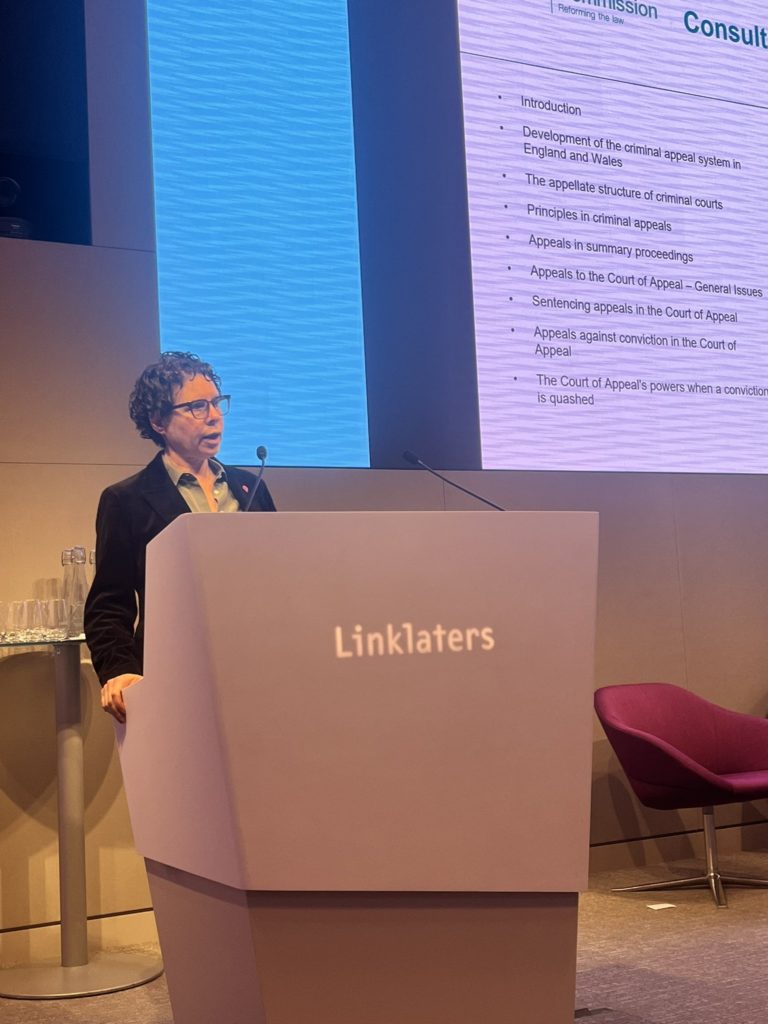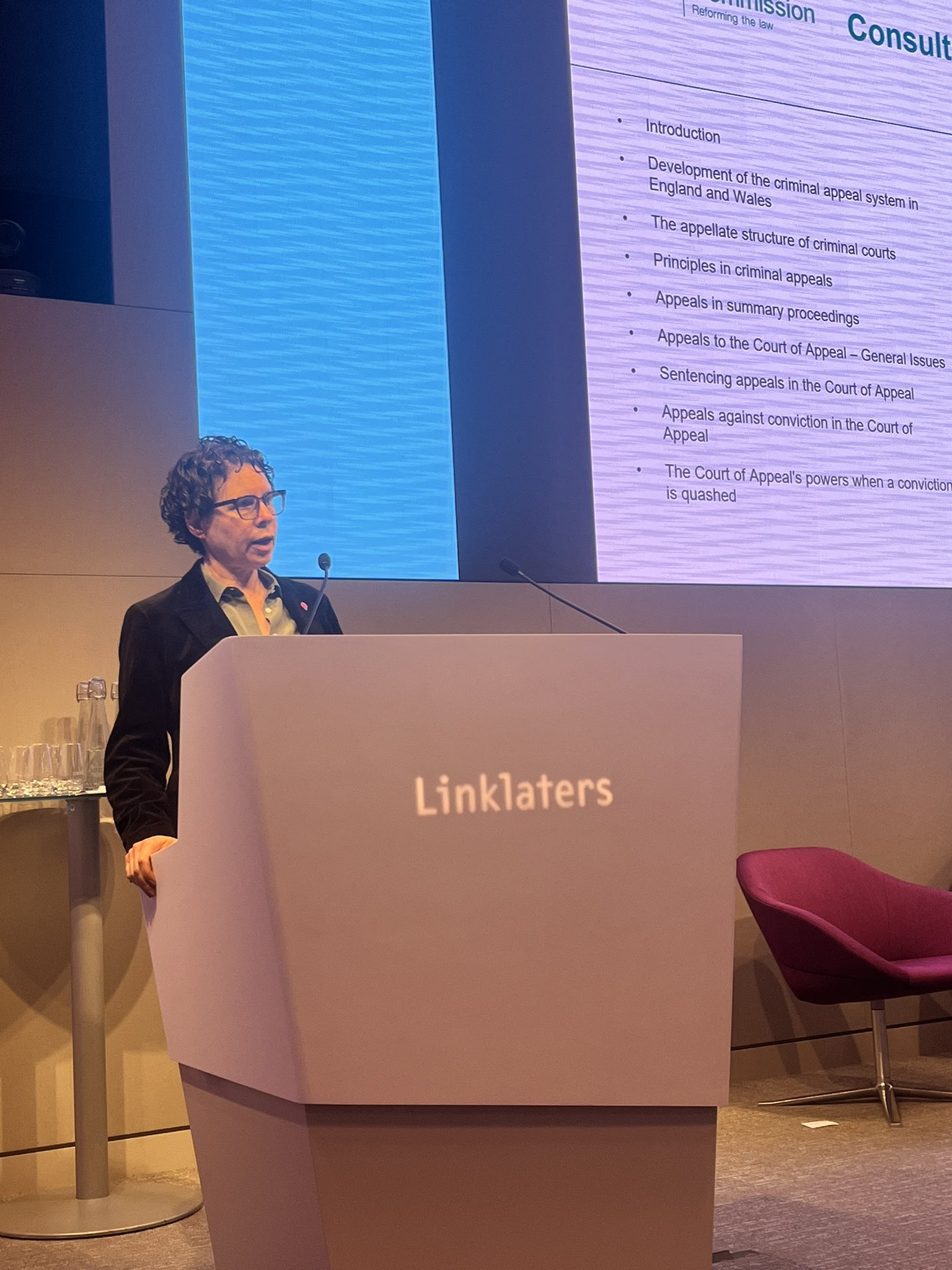The government‘s independent law reform body looks set to recommend scrapping the problematic statutory test that has dogged the miscarriage of justice watchdog body requiring it to second-guess the Court of Appeal in a move that would enable previously unsuccessful applicants to have a another chance at justice. Under the present test, the Criminal Cases Review Commission (CCRC) can only refer cases of alleged wrongful conviction back to the Appeal judges when there is a ‘real possibility’ that such a conviction would be overturned. For years, critics have argued that such a ‘statutory straightjacket’ has undermined the CCRC, leading to an increasingly timid watchdog as well as the recent crash in referrals.
Professor Penney Lewis, the law commissioner responsible for the ongoing review, insisted that changing the law was unlikely to ‘open the floodgates’ which has always been cited as the reason not to revisit the legal framework set up in the wake of scandals such as the Birmingham Six and Guildford Four. ‘We’re not persuaded that there will be some kind of flood of CCRC referrals in cases where there’s no real prospect of the Court of Appeal finding the conviction unsafe,’ Prof Lewis told the annual conference of the Criminal Appeal Lawyers Association (CALA) at the weekend. ‘We don’t see anything in the behaviour of the CCRC that makes us think that that’s a real danger. But what we do accept is that there will be people whose cases have been turned down by the CCRC, but if the test were changed, they might well apply again. I think one would be naive if one didn’t accept that.’
Professor Penney Lewis providing us with an important update on the work of the Law Commission on their Appeals Project. We look forward to reading the Consultation Paper in due course pic.twitter.com/EQQZWXHEvB
— CALA (@CrimApLawAssoc) November 9, 2024
Prof Lewis was talking ahead of a new consultation paper scheduled to be released early in the new year. That paper will provide a further opportunity for feedback prior to a final report by the end of next year. The Law Commission has received 158 responses to an earlier paper – by far the largest group of consulates was prisoners, 89.
The Law Commission is also likely to call for changes as to how Appeal judges deal with fresh evidence. Prof Lewis said that the Law Commission had looked at ‘really quite a large number of cases’ where the Court of Appeal applied the test for fresh evidence under Criminal Appeal Act 1968, section 23 in a way that was ’not consistent’ with statute. The legal academic pointed to ‘a list of factors’ for the court to take into account when assessing whether or not the admission of the fresh evidence would be in the interest of justice. She said: ’Quite frequently, not all the time, but frequently, the court treats those factors as criteria, rather than as considerations. I think that is that is a concern.’
The Law Commission is also considering ditching justice secretary Chris Grayling’s 2014 changes to compensation for the wrongly convicted described on the Justice Gap as ‘a scandal’. The rule change effectively closed off compensation for many innocent people who spent years in prison on the basis that they could not prove their innocence ‘beyond reasonable doubt’. Prof Lewis said that scheme ‘conflicted’ with ‘basic’ legal principles.
‘You’ll be unsurprised to know that many people were unhappy with the restrictive tests for miscarriage of justice compensation,’ Prof Lewis said. ‘We’re not aware of any other situation which requires the applicant to prove beyond reasonable doubt that they were innocent in order to qualify. We think that this conflicts with basic principles of both criminal and civil law, and at the very least, compensation should be payable where the applicant can demonstrate their innocence on the balance of probabilities.’
Prof Lewis, the Law Commission
Prof Lewis added that the requirement that the conviction has been quashed because of ‘a newly-discovered fact’ was ‘potentially unfair’. ‘There are cases where the conviction is quashed, but not on that basis, perhaps because the defendant didn’t have a fair trial, yet some fact later proves that they were completely innocent. In those circumstances, it’s unfair that they can’t apply for compensation, particularly given the advance and improvement in the quality of DNA evidence.’ She pointed to cases such as the Cardiff Three and Barry White. The Law Commission is looking widely at the support that’s available for victims of miscarriages of justice including wiping criminal records and ensuring National Insurance Contributions records are not unfairly impacted because someone is wrongfully incarcerated.
Many respondents highlighted problems with evidence retention and access to evidence. Prof Lewis said:’We received a lot of evidence that investigations into miscarriages of justice are being hampered by the loss or destruction of potential relevant evidence.’ She highlighted the work of the investigative journalist Louise Shorter as wells APPEAL’s work on the Andrew Malkinson case. ‘If that case had relied only on the DNA evidence retained by Greater Manchester Police, then there wouldn’t have been the quashing of the conviction,’ she added.
She went on to say there was ‘a case for wholesale reform’ of the rules around post-conviction disclosure. The law Commission had heard ‘a lot of evidence’ about police forces telling lawyers that they wouldn’t provide disclosure unless the CCRC ordered it which, Prof Lewis pointed out, was a misinterpretation of a Supreme Court ruling (Nunn). ‘One of the options that was raised with us was whether there should be a national forensic archive service. It seems like a good idea to us. Evidence in the Malkinson case was retained by the the forensic archive following its closure, and it was able to be tested at the behest of APPEAL. We’re aware of a number of cases where evidence ought to have been retained and it has been destroyed or lost.’
*
In a separate session on legal aid, CALA chair Steve Bird revealed just 0.2% of the criminal legal budget was now spent on appeals work. In recent years, the CCRC has seen the proportion of applications from people without legal representation climb to around 95%. Bird points out that the present hourly rate for solicitors doing legal aid work was just £52 an hour – this represented, after inflation, of a 58% cut since 1996.
Bird pointed out that in 2012/13 a total of £5.1m was spent on over 4,000 cases; however as a results of the Coalition government’s legal cuts that budget dropped to £2m by 2015 covering 1,500 cases. ‘But the number of people actually getting this representation, dropped from a high of over 4,000 cases in 2013 to below 800 a year this year. The spend in March 2024 was 1.8 million for this scheme, and the total criminal spend was one just over £1bn. So we’re looking at 0.2% of budget going on this work.’
The restrictions on eligibility are very tight (and complex). If an applicant is on Universal Credit, then they qualify unless they have more than £1,000 in capital; if they are working, or their partner is working and they’re in prison, and there is disposable income of more than £99 a week, they don’t qualify; and if they have got more than £1,000 in capital, they don’t qualify. There are allowances made for dependants.








